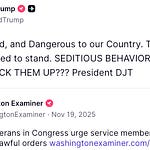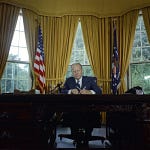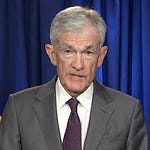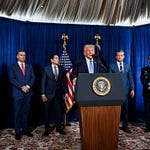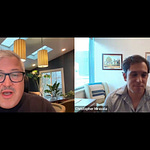Bob talks with historian Walter Stahr about William Howard Taft’s model of the presidency. The conversation covers Taft’s remarkably varied career across the executive and judicial branches, his differences with Theodore Roosevelt over the scope of executive power, his stance on war powers, and the significance of his post-presidential writing on executive authority and responsibility.
Mentioned:
Walter Stahr, Stanton: Lincoln’s War Secretary (2017)
William Howard Taft, Our Chief Magistrate and Its Powers (1916)
Theodore Roosevelt, An Autobiography (1913)
Thumbnail: Republican President candidate William Howard Taft, outside his campaign train in 1908. (Everett Collection, Shutterstock.)
This is an edited transcript of an episode of “Executive Functions Chat.” You can listen to the full conversation by following or subscribing to the show on Substack, Apple, Spotify, or wherever you get your podcasts.
Bob Bauer: Good morning, Walter.
Walter Stahr: Good morning. How are you doing, Bob?
Very well, thank you, and I hope you are too. I want to introduce you to our Executive Functions viewers. Walter Starr is an historian of considerable note.
He has a background as a practicing lawyer, both domestically and internationally, both in private practice and in government. And then, fortunately, he turned to full-time writing of history. He has done so with great success and has written works on William Seward, John Jay, Sam and Chase, and now is working on a biography, which will be published in 2026, possibly on Election Day 2026, about William Howard Taft.
And Walter and I met, actually, through a mutual friend who was very instrumental in my appreciation of history, my high school history instructor, Jack Kearney. And I was very glad that Jack made that introduction. And so that’s what brings us to the current day.
And the Taft story is an important story because what we’ll focus on today is how Taft’s presidency was distinctive, specifically through the way he thought about and later articulated views about the exercise of presidential power. It’s a model of sorts, a different model of thinking about the presidency that I don’t think is generally well understood.
But let me begin, Walter, by asking you the following. The understanding of Taft, of course, is that he had an exceptional career and was both president and chief justice of the United States Supreme Court. But he also seems to have had positions as a legal advisor in the executive branch, virtually any one, any such position that anybody could hold. Can you walk us through that exceptional history? Because I think it bears on what he learned about and then came to understand to be the right way to think about the presidency.
Sure. I should mention that we shared Jack as history teacher, and Jack also was the person who introduced me to Washington in the spring of my senior year at Exeter. He was the head of the Washington intern program, but tasked with the almost impossible task of keeping two dozen young interns out of trouble and gainfully employed.
Taft really was not much older than a college student when he started his career of public service in Cincinnati, Ohio, as a junior prosecutor, and then grows very quickly. He was the youngest person ever to be solicitor general of the United States. And that job in those days included not just what we think of as the solicitor general’s job, representing the United States in the Supreme Court, but also what used to be your job, Bob. There was no White House counsel.
And so, when President Benjamin Harrison wanted a legal opinion, he turned to his friend, the attorney general, but he turned often to his young solicitor general, William Howard Taft, who was in the White House a lot in the Harrison administration. So the Congress, to relieve the crowding in the Supreme Court, creates the Circuit Courts of Appeal. He’s a circuit judge for eight years in Cincinnati. He’s really, throughout his life, he’s sort of a judge in his bones.
Then is our governor of the Philippines for four years. So sees Washington from a very long distance at that point, but then comes back and sees it very up close as Theodore Roosevelt’s war secretary, member of the cabinet, and really kind of almost deputy president for Roosevelt.
You know, like every president down to the late 20th century, Roosevelt didn’t rely on his vice president, almost never saw his vice president, whereas Taft was with him all the time, talking about politics, about the administration, as well as the more narrowly defined job of the War Department. So by the time Taft is elected president in 1908 and takes the oath in early 1909, he’s seen a lot of presidents up close and personal, and he’s had a lot of other experiences as a judge running the Philippines that give him very decided views about, you know, the American constitutional system.
So in summary, and then we’ll get into it in a little bit more detail, how did Taft come to think about the exercise of presidential power? And in particular, since you’ve mentioned Theodore Roosevelt, can you describe, first of all, the difference that Roosevelt saw in their approaches, his approach and Taft’s approach to presidential power, and what you actually thought that difference amounted to?
Yeah. Well, we’re blessed in that not only were, you know, Taft and Roosevelt both presidents, so we can kind of look at how they administered, but they both wrote about this issue. First, Roosevelt puts pen to paper not long after the disastrous, from Taft’s perspective, 1912 presidential campaign on an autobiography, in which Roosevelt derides what he calls the Buchanan-Taft view of the presidency, linking Taft with the person who at that time was viewed as the worst American president, James Buchanan, a view that, in Roosevelt’s view, sort of only was willing to do something if you could find a provision of the constitution or a statute that authorized it.
No, Roosevelt said no. His view was that unless there was a prohibition, a clear prohibition, the president should do what he thought best for the American people.
Taft disagreed with that, first in lectures at Yale, and then in a book that he published not long thereafter. He said, no, no, this notion that there’s some undefined residuum of presidential powers is all wrong. The president can only do what Congress has authorized him to do or what the constitution itself fairly interpreted authorizes.
That term, undefined residuum of presidential power, just to be clear, is the language Taft used to describe Roosevelt’s view.
Correct. He used that to criticize and warn against the Roosevelt approach of sort of really going first for what the people need, and then, unless there’s some prohibition, going ahead and doing it.
The concrete example that they both had in mind was while Roosevelt was president, he set aside, that was the vocabulary, tens of thousands of acres of undeveloped land and said that they could not be developed. There was no statutory authority whatsoever for this. One of the first things that Taft had on his to-do list when he became president in 1913 was to get legislation out of Congress to, in essence, ratify what Roosevelt had done.
He didn’t, as Secretary of War, he didn’t raise his hand and say, no, no, don’t do this. But he thought that this was not going to stand up in court if challenged unless there was a statute. And he did get that statute through Congress.
Let me ask you a question about that move to Congress for authorization. Did it come under any kind of pressure? You had said he had it on his to-do list, but did he feel compelled by any kind of external push? Criticism and the like? Or was it something he thought he should do in, if you will, cleaning up the legal authority behind what Roosevelt had done?
I have not seen any sort of external, and in particular, as best I can tell, there was no lawsuit wending its way through the courts headed up towards the Supreme Court. You know, developer versus Roosevelt. It was just, you know, as a kind of dot the I’s and cross the T’s kind of judge, Taft felt that this was something that needed doing or else there would eventually be some lawsuit and the government would lose.
So let’s talk for a second about Taft as lawyer—very engaged with judging, very engaged with lawyering—and Roosevelt, who also went to law school but apparently hated it. The question I’m sort of moving to here is, did Roosevelt have a legal advisory apparatus that he proposed any trust in or cared to consult with any degree of regularity?
Well, he had, you know, the same people, you know, they were not the same people, but you know, there was an attorney general, there was a solicitor general. But unlike Taft, who would, you know, as a former Justice Department official, would, you know, refer questions to the Justice Department and take their advice, Roosevelt, as best I can tell, didn’t rely heavily upon lawyers, didn’t value legal advice terribly highly.
One example that springs to mind, there was a rebellion or revolution really going on in Cuba and Roosevelt was about to send Taft down to sort it out. Taft wrote him a three-page letter kind of explaining why he, he, Taft, didn’t think it necessary to seek authorization from Congress. There was already something in place called the Platt Amendment that Taft thought sufficient. But he ends by saying, you probably want to consult with your attorney general and perhaps even with Congress about this matter or key congressional people.
To which Roosevelt responds, I shall not confer with either the attorney general or with Congress. No, if an action becomes necessary, I shall take action and establish a precedent for presidents in the future. And that, I think, is probably, you know, a good example of the general Roosevelt attitude towards lawyers.
Again, we should be clear, we’re talking here about Theodore, not his distant cousin, Franklin.
Yeah, I should mention his distant cousin, Franklin, wasn’t all that crazy about lawyers either. And his attorney general, Robert Jackson, later on the Supreme Court of the United States, of course, wrote in a book of memoirs that Jackson had no particular use for lawyers, not that he didn’t involve them or consult them, but he did not view them as particularly useful contributors to the pursuit of the policies that he was interested in.
Let me then ask a question that will come up in anybody’s consideration of Taft. And that is that he’s very prominently associated, of course, because he wrote the opinion in a case on presidential removal power, the Myers case. And there, and that case is frequently cited, as indeed it would be, for a very, very robust view of the president’s authority to fire senior officials in the government.
And so somebody might ask, well, he wrote that opinion, doesn’t that imply, maybe he would not be in contemporary terms an advocate of a unitary executive view as we currently understand it, but it certainly seems like he had in that respect a opportunity to curtail presidential power. And in fact, he did not. He authored an opinion that’s cited by presidents who were looking to expand on that power.
Can you give us some background on the Myers case and how that doesn’t in fact affect your analysis of the Taftian view of the presidency?
So Taft becomes chief justice in 1921. And one of the cases that, I mean, indeed the most important single case of his time on the court is this Myers case, which actually, as is often the case with cases from that era, it has a long history because cases took a long time to get to the court and then win their way through the court.
And as you say, the opinion is full of things that reflect his own extensive experience as both a subordinate and then president. He talks about how it’s impossible for the president to do everything himself and he has to rely on subordinates. He has to rely on reliable subordinates. It just can’t be, Taft said, that those who drafted the constitution meant to hobble the president with advisors upon whom he could not rely.
So as you say, it does in that respect reflect a broad view of presidential power. I don’t think though that it’s inconsistent with his view that you have to trace to a statute or the constitution. He does spend a lot of time both with the language of the constitution and with the how it was understood by those who had drafted and were tasked with first implementing it.
There’s an interesting bit that’s not in the Myers opinion that I think shows that he didn’t envisage the president as having the power to remove every single member of the executive branch. In the late stages of the process, as those in the majority were reading the dissents, one of those in the majority, Harlan Stone justice and later chief justice, sends a note to Taft saying, look, let’s deal with this argument in the dissents about the civil service laws by simply saying that the president has the ability to remove anyone regardless even of the civil service laws.
And Taft, unfortunately, we don’t have a written answer from Taft to that memo, but we sort of know what Taft thinks from the opinion. Taft disagrees with that. He’s been a long champion of civil service reform going back to the days when as a junior revenue officer, he was besieged with requests to hire what he thought were unsuitable people for his revenue office.
And so he does not think that the Myers principle, if you will, invalidates federal civil service protections and exactly where the border is is left unclear in the Myers opinion. I mean, they don’t have to draw the border precisely. They simply draw it such that Myers, who was what was then known as a first class postmaster, which were sort of the eyes and ears of the president around the country, that Congress could not prevent the president from removing him without Senate consent.
Tell us a little bit about another episode that could also shed some light on how he approached the issue in Myers and what it means generally for his view of presidential removal power. He addressed a case you’re very deeply familiar with, I’m not, that involved removal of the members of an entity known as the Board of General Appraisers, I believe. Can you talk a little bit about how he approached that and how do we build that into how we understand his conception of presidential authority?
Sure. So the Board of General Appraisers was a quasi-judicial body. These were not Article III judges. They did not have life tenure. They could be removed by the president and it’s a variation of that fairly standard wording about inefficiency, neglect of duty, et cetera.
And when he heard rumors, this is in the summer of 1912, so the last year of his presidency, when he heard rumors of this, he didn’t just immediately fire those accused of mismanagement. No, he set up a little committee of three government lawyers and when one member of this committee got sick, he appointed someone whose name is very familiar to us today, although it was utterly unknown at the time, Felix Frankfurter.
Frankfurter was at the time a junior lawyer in the War Department and this committee took evidence, it held hearings, it actually heard from those accused of misconduct and recommended that two members of the board should be removed by the president and on the last full day of his presidency, so like the eve of the inauguration of Woodrow Wilson, Taft goes ahead and does that.
In one case, the person was apparently an alcoholic and thus frequently absent for meetings and in the other case, and the bit that really got the headlines, there was an official who was both writing opinions in a way that benefited his son who was a New York City lawyer specializing in tariff cases and also requiring the Baltimore and Ohio Railroad to stop its trains at his summer house so that he could get on and off at convenient moments. And that may not be the worst thing that federal officials have ever done in the long history of federal corruption, but for some reason, that really grabbed the attention of the reading public.
Anyway, Taft accepts the recommendations of the Frankfurter committee and removes these two people on his last full day in office. Again, I think it doesn’t directly translate, but it certainly indicates an adherence to process in removal in Taft’s view of how these things should be done.
And on his part, it seems he took seriously that Congress has specified certain grounds for removal and so he should go about in a judicious way determining whether those grounds in that particular case existed. So it was Taft as lawyer again.
And Taft as judge.
And Taft as judge. Yes.
Right at the same time at the very end of his presidency, there’s a statute passed to increase the requirements for immigrants—in essence to impose an English literacy requirement for all immigrants to the United States, and the newspapers analogize this to a court hearing. Taft organizes a half day of a judicial hearing at the White House in which he’s not in robes, but he’s almost in robes, listening to arguments on both sides.
He ultimately vetoes that bill and the veto is very narrowly sustained, actually mainly with Democratic votes. He’s a Republican president, but he gets that veto sustained with the votes of Democrats who are, I think, more rightly alive to the sort of racist and xenophobic motivations of that literacy requirement.
So let’s turn now to another, of course, both of contemporary significance, lasting significance in all debates about presidential authority, and that’s the war-making power. And I’d be interested in Taft’s history and in particular, we’ve talked about his differences with Roosevelt. Let’s also bring into that, if we could, his differences with Woodrow Wilson.
Sure. Well, and we also ought to bring in his qualms and differences with William McKinley over the Spanish-American War. In the spring of 1898, when the Maine explodes and war fever really rages in America. I think it’s fair to say that Taft is way on the uninfected and cautious side of the spectrum.
There’s a letter from him to McKinley. So this is from a sitting federal judge to the president, sort of praising McKinley’s caution and hesitancy and saying that, you know, he should remain cautious and hesitant. This is on the very same day that Roosevelt writes to a family member saying that he (Roosevelt being at the time the assistant secretary of the Navy), saying that he had told the president and the whole cabinet that the only course was war.
So he’s cautious and in that, during his own presidency, there are a number of incidents where we could have, you know, viewed it as legitimate cause for war with Mexico. He says, no, no, we are not going to war with Mexico.
And then during the Woodrow Wilson presidency, when Wilson really does go to war with Mexico, although in a limited way, but with both the invasion of Veracruz and then the Pershing expedition in Northern Mexico, Taft is quite critical in private letters, although he does largely observe the conventions about, you know, former presidents not criticizing the current presidents, at least on matters of foreign policy.
He’s also critical in the run up to the First World War. And here he is a little bit publicly critical. Wilson spends a long time before he finally sends out a note to Congress saying, okay, okay, come to Washington and we’ll talk.
Taft, who’s been spending the time sort of traveling around the country, thinks that that showed a lack of respect for Congress and a failure to appreciate that he wasn’t just going to need a declaration of war, he was going to need various bits of legislation, draft legislation, armaments legislation, et cetera. And this is going to take time. And so he felt that Wilson had failed in that and at some other junctures to accord sufficient respect to Congress.
Now, when Roosevelt criticizes Taft’s conception of the presidency, he, as you said earlier, you know, he puts himself in Lincoln’s camp, he puts Taft in Buchanan’s camp. Would you say as we, and of course it’s unimaginable how much has been written about Lincoln, and it’s a huge topic, but is Roosevelt right to claim the Lincoln legacy?
One view, of course, has been, yes, Lincoln certainly aggressively exercised the powers of the office, but he did so in what was an existential set of circumstances for the country and the question of whether the union would survive and whether slavery would be brought to an end. Would you say that Roosevelt, if you will, is skipping over that point or that he does have a conception of the presidency that is comparable to Lincoln’s, even again, you know, setting aside the emergency wartime conditions?
As you say, Lincoln is a big topic. And I’ve contributed a certain amount to that pile of books, although I haven’t written about Lincoln directly, obviously there’s a fair amount, I’ve written about three members of his cabinet, so there’s a fair amount about Lincoln and the war.
In a book that you didn’t mention about Edwin Stanton, the Secretary of War, I spend a fair amount of time dealing with what I find very troubling arrests of editors and other opponents of the war effort. And, you know, these are not, you know, we don’t have like a little piece of paper from Abraham Lincoln to the war secretary saying, please arrest Clement Vallandigham, Vallandigham being an Ohio former member of Congress who’s thinking of running for governor. He’s actually thinking of challenging Lincoln for the 1864 presidential nomination.
Vallandigham’s arrested by a union general, but Lincoln is well aware of the arrest and he doesn’t send a note saying, you know, release him, he didn’t do anything other than give a speech criticizing me. No, he allows the trial to proceed and Vallandigham is sentenced to spend the rest of the war in prison and then Lincoln, you know, commutes the sentence to exile.
But we still, would we really consider it, how to put it, a proper way of treating one’s critics for the president to allow them to be tried by military commissions and exiled to Canada? We, you know, I think a lot of us left and right would find that very troubling and yet that’s part of Lincoln’s legacy.
So long-winded way of saying, I think Theodore Roosevelt has a point that Lincoln is a key figure in the line of what we might call the more aggressive presidents, you know, which you might trace from Lincoln through Theodore Roosevelt to Woodrow Wilson to FDR and down to the imperial presidency.
Well, this is a topic that obviously is going to be debated forever and today. I do want to close here by asking you to talk a little bit because I think it is exceptional about Taft’s writings on the topic and just so people who want to pursue it can look for them. These are not, as I understand it, you know, just casual observations interspersed with memoirs.
I mean, he really attempted, I take it, to articulate a view of presidential power, the executive, and I just wanted to put an exclamation mark on that so that people were aware of it and those who were interested in this, again, as one model of thinking about the presidency that they could go look for it and read it for themselves.
Sure. Well, the particular book I was referencing is called Our Chief Magistrate and Its Powers. It was published in 1916 and so it’s out of copyright so you can find it relatively easily on Hathitrust or other places.
And actually, that’s not the only, he tackled that topic again. I think there’s another book from that period between the White House and the Chief Justiceship with a similar title. And these, the general flavor of these books, I mean, it’s interesting. They are largely about the limits on the powers of the president and this former president is talking about how those limits are a good thing.
So, for example, on the subject of congressional investigations, which presidents by and large are not a fan of congressional investigations. No, former president Taft says that it’s a good thing that Congress has the power to investigate the administration. And indeed, one of his Supreme Court cases, a decade later, the Doherty case, is one of the sort of key foundations of the law on that subject.
So it’s not all that hard to find Taft’s writings on these subjects.
So I’m not aware, check me if I’m wrong. I mean, I don’t know offhand that maybe I’m missing something. There is any other president who has written after leaving office, a book essentially of constitutional theory, much less one that is focused on limits on the power of the office that he previously held.
Am I missing something?
No, I can’t think of anyone. Let me, I suppose in fairness to our former presidents, many of them either died in office or died not long after leaving office. So they didn’t have a lot of time for writing.
But yes, it is interesting that what he writes in his post-presidential years is really not a conventional presidential memoir, you know, great big thick book in which the first person predominates. As you say, he writes books that are, you know, sort of learned constitutional books. And he writes on other topics too, but he spends a lot of time thinking about the presidency.
And he has actually some, you know, really excellent suggestions. For example, one of his suggestions, which he makes both in speeches and then in print, rather than having two terms. So the president from day one is focused on his re-election. Why not amend the constitution? So we have, we elect a president, we elect a president for six years and he or she has no right to run or serve again.
You know, if you think about it, a lot of problems in American history, Watergate, you know, might not have happened if we had, if that rule had been in place because we would have had president Nixon for six years and he wouldn’t have had to run a re-election campaign.
It is a remarkable legacy and I really appreciate you taking the time to discuss it with me today. I think Taft gets overlooked and a big part of that has to do with the particular roles and circumstances in which, you know, we think about Woodrow Wilson, Theodore Roosevelt, but in any event, a remarkable figure and a president that was prepared to think hard about the office and not only in, if you will, completely self-interested terms. That is, as an opportunity to exercise the most possible power that he could amass.
So thank you very much, Walter. And again, this Taft biography is going to be published next year, possibly on Election Day, 2026. And so I’m looking forward to reading it. Thank you for coming.
Thanks for having me, Bob.




